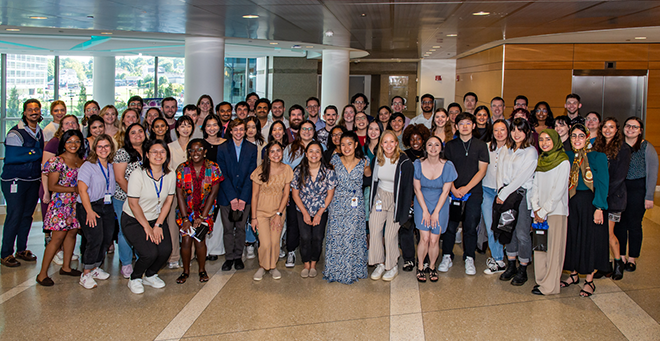PhD candidate Jessica Peura, of Richmond, Vermont, is studying pancreatic cancer in the lab of Jason Pitarresi, PhD, assistant professor of medicine, to prevent families like her own from experiencing cancer-related loss.
Peura said her love for her mother, Carolyn, a Worcester-born nurse, motivates everything she does, from studying in the Morningside Graduate School of Biomedical Sciences’ Cancer Biology Program to reminding herself not to give up on hard days. Peura’s mother died of a rare cancer called leiomyosarcoma.
“I have pictures of my family on my desk. They’re my daily motivation when an experiment isn’t working and I’m wondering why I’m doing this,” Peura said.
This year, the PhD student earned a Ruth L. Kirschstein National Research Service Award Individual Predoctoral Fellowship from the National Cancer Institute to advance her research. Pancreatic cancer often goes undiagnosed until it’s already spread to other regions of the body, making it hard to remove surgically. Peura is analyzing how cancer spreads and has developed a highly metastatic research model that replicates the phenotype seen in patients.
“It’s fantastic that I can model pancreatic cancer metastasis in about 90 days or less—as a PhD student, that’s game changing,” said Peura, who explained that base models take 150 to 200 days to succumb to disease, often not showing metastases and expiring from a primary tumor. “Looking at drivers of metastatic burden is an unmet need in the field right now.”
"Jessica is one of the most hardworking, intelligent and passionate PhD students I’ve had the privilege to work with,” said Dr. Pitarresi. “Watching her unravel the mechanisms of pancreatic cancer metastasis has been nothing short of inspiring—her work is not only advancing science, it’s paving the way for new hope in one of the deadliest diseases we face."
Peura earned her bachelor’s and master’s degrees in bioengineering at Northeastern University and worked at Pfizer and Fulcrum Therapeutics in Cambridge before enrolling at UMass Chan.
“Because of my mom’s rare cancer, I got frustrated by the lack of knowledge and treatments available for many patients,” she said. “Biotech is focused on where the highest patient population is, but there are still patients with nothing. That experience drew me to the lab I’m in now, which focuses on overlooked effects of pancreatic cancer.”

